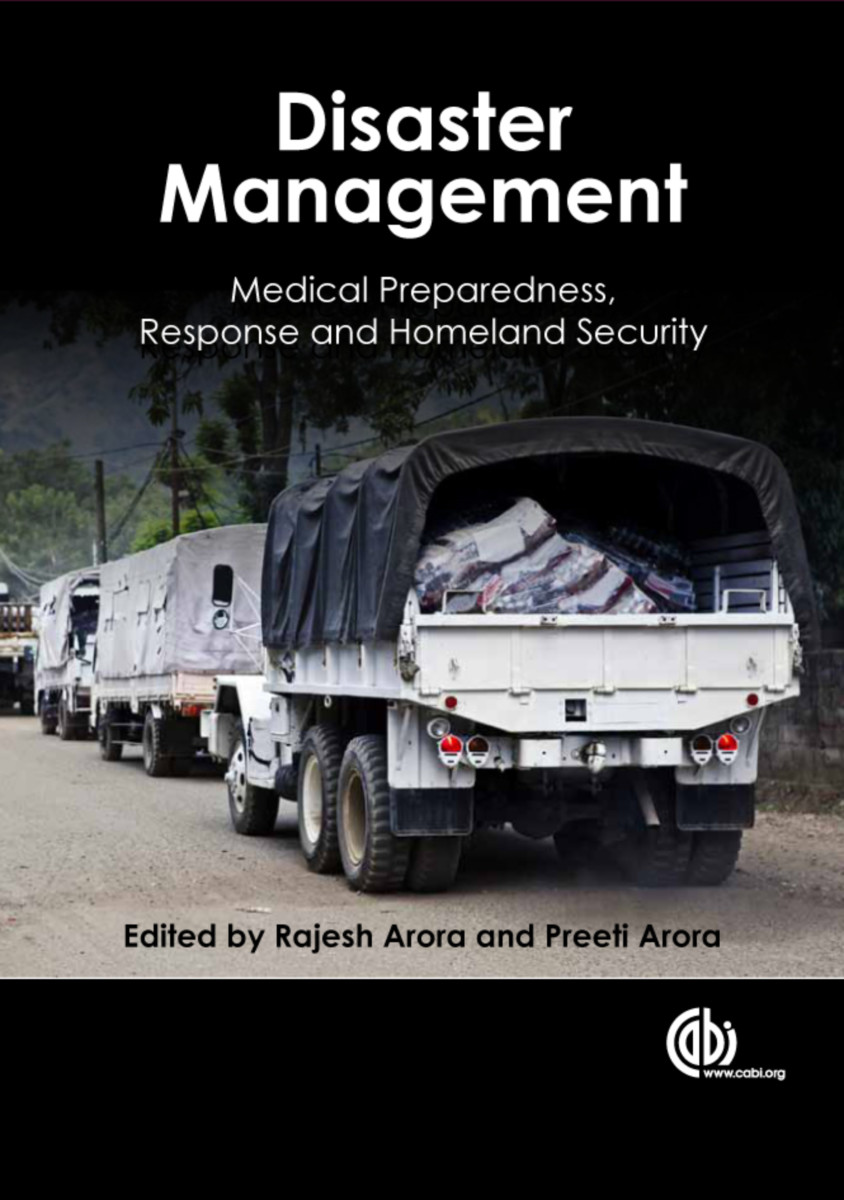Disaster Management
Medical Preparedness, Response and Homeland Security
- Publisher
CABI - Published
8th October 2013 - ISBN 9781845939298
- Language English
- Pages 670 pp.
- Size 6.75" x 9.5"
- Images figures & tables
Disaster management is an increasingly important subject, as effective management of both natural and manmade disasters is essential to save lives and minimize casualties. This book discusses the best practice for vital elements of disaster medicine in both developed and developing countries, including planning and preparedness of hospitals, emergency medical services, communication and IT tools for medical disaster response and psychosocial issues. It also covers the use of state-of the-art training tools, with a full section on post-disaster relief, rehabilitation and recovery.
Section 1: Disasters and Homeland Security: An Introduction
1. Disaster Management And Homeland Security: A Holistic View to Managing the Inevitable
Section 2: Mitigation, Training and Medical Preparedness
2. Healthcare Emergency Management
3. Public Health Impact of Disasters
4. The Role of the Primary Care Physician
5. Manikin Simulation for Mass Casualty Triage Training
Section 3: Crucial Role of Communication in Disaster Management and Homeland Security
6. The Role of Social Networking in Disaster Medicine and Homeland Security
7. Communications and Focus on Resource Needs and Allocations for High-Risk and High-Tech Patients
8. Application of Mobile Grid for Disaster Management
Section 4: Disasters and Mass Casualty Incidents: Incident Site Command and Control, Point-of-Care Testing
9. Disaster: Point-of-Care Testing
10. Incident Command Systems
11. Incident Site Command and Control
12. Disasters in Medical Care Contexts: Planning for Resilience in Incident Command Personnel and Systems in Hospitals
13. Information Management during the Disaster Medical Support Planning and Execution Phases
Section 5: Medical Management of Disaster and MCI Victims in Hospitals
14. Medical Surge in the Hospital and Beyond: Expectations and Preparations
15. Integration of Synergy of Pre-hospital and Hospital Protocols in Emergency Patient Management
16. Mass Casualty Management: From The Emergency Room to the ICU - An Anesthesiologist Perspective
Section 6: Securing the Homeland: The Medical Way
17. Management of Suicide Terrorism: Medical Aspects
18. Hospital Triage in Mass-Casualties resulting from Terrorist Attacks
19. Medical Planning for CBRNe Events
20. Role of Military Hospitals in Handling CBRN Disaster
21. Pandemic Influenza
22. Civilian Aspects of Decontamination
23. Triage and Treatment Tools for Radiological Incident Management
Section 7: Emerging Health Threats: Managing by Prophylactic and Therapeutic Approaches
24. Super-Humanized Antibodies: Application to Biodefense
25. Medical Support in Case of Chemical and Biological Incidents
26. Medical Management of CBRNe Emergencies: Recent Advances in Prophylaxis and Therapeutics
27. Prophylactic Possibilities in Case of High Risk to Nerve Agents Exposure
Section 8: Handling Psychosocial Issues: A Difference in Perspective (Developed and Developing Nations)
28. Collective Resilience versus Collective Vulnerability after Disasters: A Social Psychological Perspective
29. Planning, Development and Implementation of a Psychosocial Support Program
30. Disaster Mental Health: A Paradigm Shift from Curative to Preventive Psychiatry
31. Lessons From Tsunami: Future Psychosocial Programming and Interventions following Disasters
Section 9: Bridging the Great Divide: The Challenge of Managing Disasters and MCIs in Resource-poor Settings
32. Lessons from International Experience for the Developing World
33. Managing Disasters through Health Security Approach
34. Health sector Recovery in Low-resource Settings
35. Issues Affecting Hospital Readiness/Response in Mass Disasters: An Indian Perspective
36. Preparing Effective Disaster Plans and EMS for Low-resource Settings
Section 10: Post-Disaster Relief, Rehabilitation and Recovery
37. Medical Issues in Post-Disaster Reconstruction
38. Identification of Victims of Mass Disasters
39. Social Aspects of Natural Disasters
40. Women, Children, the Disadvantaged and Disasters
41. Children in the Aftermath of Disasters: Kindling a Ray of Hope
Rajesh Arora
Rajesh Arora is with the Defence Research and Development Organization, India.
Preeti Arora
Preeti Arora is at the Guru Gobind Singh Indraprastha University, India.


